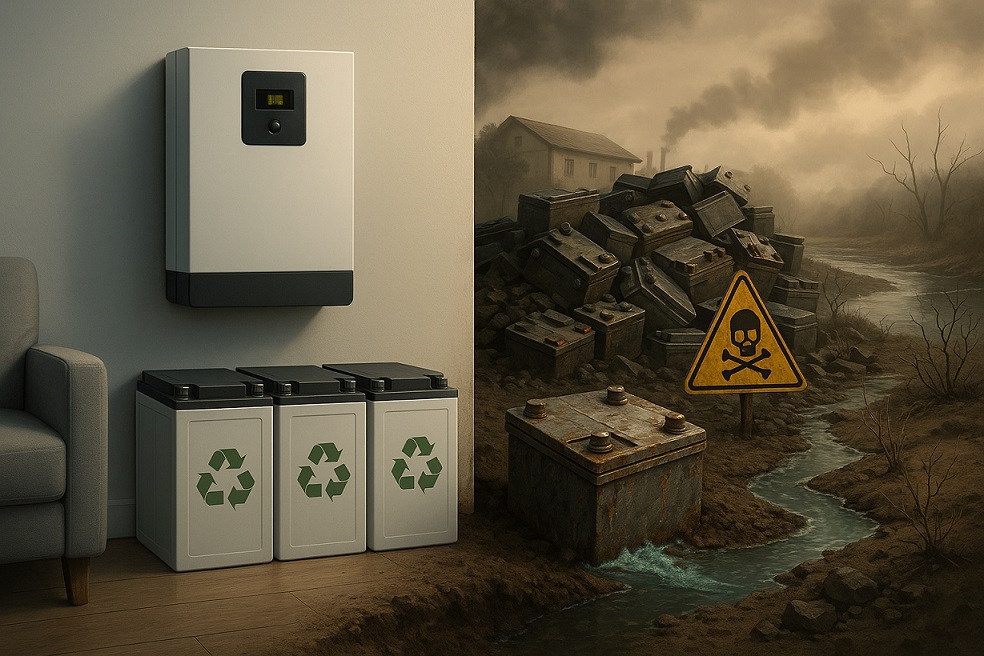
Power cuts aren’t just inconvenient—they can disrupt everything from your evening routine to important business tasks. So, it’s no surprise that backup batteries have become a go-to solution for homes and offices across India and beyond. But while these systems keep the lights on, there’s a side of the story that’s often overlooked: the environmental cost.
Have you ever wondered what happens to your battery when it stops working? Or what’s inside that heavy box powering your inverter? The answers may surprise you—and not in a good way.
Let’s uncover the real story behind backup batteries, their hidden environmental impact, and why switching to Lithium Batteries and Inverter Lithium Batteries could be a much smarter (and cleaner) move.
The Convenience of Backup Power—At What Cost?
Traditional backup systems usually rely on lead-acid batteries. They’ve been around for decades, and they’re known for being reliable and relatively affordable. But what most people don’t know is that these batteries are toxic time bombs when not handled correctly.
Lead-acid batteries contain lead (a highly toxic metal) and sulfuric acid, both of which can cause serious harm to the environment and human health if they leak, break, or are improperly disposed of.
Unfortunately, improper disposal happens more often than you might think. In many areas, batteries are thrown out with regular waste or recycled in unregulated facilities. This leads to soil and water contamination, air pollution, and even long-term health risks for workers handling battery components without protective gear.
So while your backup battery might be a savior during load-shedding, it might also be silently polluting your surroundings.
Short Life, Long-Term Pollution
Another major concern with lead-acid batteries is how short their lifespan is. Typically, they last around 2 to 3 years, especially with heavy usage. Once they wear out, they’re tossed, replaced, and the cycle continues—creating tons of hazardous waste over time.
This cycle of frequent replacement not only adds to landfills but also demands more raw materials, more energy for production, and more pollution from transportation and manufacturing. It’s a loop that seems convenient for us but costly for the planet.
The Greener Way Forward: Lithium Batteries
Now, here’s the good news: clean and efficient alternatives are already available. Lithium Batteries are making a huge difference in how we store power—whether it’s for electric vehicles, solar energy systems, or inverters at home.
Here’s why Lithium Batteries are better for you and the environment:
- No toxic lead or acid: There’s no risk of hazardous leaks.
- Longer life span: These batteries can last 7–10 years, meaning fewer replacements and less waste.
- Higher energy efficiency: They store and release energy more effectively, which helps you save on electricity.
- Compact and low maintenance: Smaller in size, lighter in weight, and no regular water refills needed.
They’re cleaner, smarter, and simply make more sense in today’s eco-conscious world.
Why Inverter Lithium Batteries Make All the Difference
If you’re still using a lead-acid battery in your home inverter system, it might be time for a much-needed upgrade. Inverter Lithium Batteries are designed specifically for backup power systems. They charge faster, last longer, and are far more efficient in how they manage energy.
And guess what? You don’t have to worry about acid spills, rusted terminals, or constant maintenance. These batteries are practically plug-and-forget.
Sure, they may cost a bit more upfront—but the long-term savings, environmental benefits, and peace of mind make it totally worth it.
Your Choice Matters More Than You Think
The next time your inverter kicks in during a blackout, take a moment to ask yourself: What kind of power am I really using?
We don’t often connect backup batteries to pollution, but the link is there—and it’s stronger than most of us realize. Choosing to switch to Lithium Batteries or Inverter Lithium Batteries isn’t just a tech upgrade; it’s a conscious choice to reduce your carbon footprint and support a cleaner planet.
When millions of people make small changes, the ripple effect is massive. Cleaner air. Healthier soil. Safer water. It all starts with the decisions we make in our homes.
Final Thought: Power Responsibly
Backup power should help us—not harm the world we live in. So if your current battery is doing both, maybe it’s time to make a change.
With Lithium Batteries, you don’t have to choose between reliable backup power and environmental responsibility. You get both—and that’s the kind of win-win the planet needs more of.
Let your next power backup choice be one that powers your home and protects the Earth.
Comments on “Backup Power or Environmental Risk? Know the Truth”